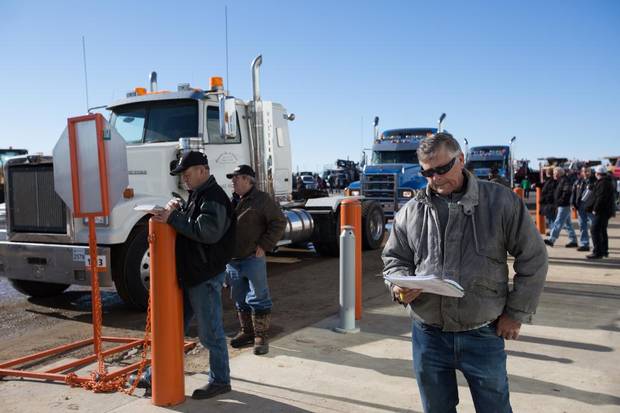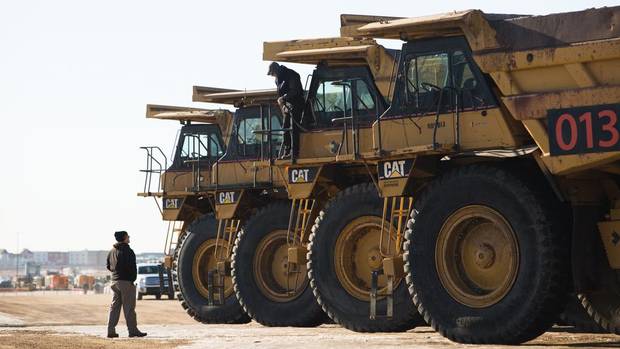Wayne Finch was perched on the edge of his seat as a red and chrome semi-truck was driven up to an auction hall in this industrial suburb of Edmonton. The Montana logger came to Alberta in late February looking for a deal – and while he knew the province to the north was struggling, he wasn't prepared for the economic troubles on display at the sale.
"It certainly sounds like a lot of these guys are out of work. It just doesn't sound good, a lot of these trucks are up here for lack of payment," he said, cringing. "The prices on some of these trucks are a killing, honestly."
Lot No. 1513 rolled up next, a white Western Star Sleeper truck with the logo of a defunct oil and gas company on the driver's door. Catching his breath between fast-paced bids, the auctioneer told bidders that the truck was on sale for non-payment. Mr. Finch moved to make a bid, but the price quickly climbed and it was sold to an online buyer.
A cloud of exhaust hung in the frigid air outside the auction hall near Edmonton's main airport as the engines of hundreds of semi-trucks and other vehicles idled throughout the day.
Trucks of all sizes were paraded past Mr. Finch for hours on Feb. 25, as he and hundreds of others at the Ritchie Bros. auction made bids at a sale seen as a barometer of Alberta's economy. With more than 13,000 bidders looking to buy cheap equipment – the second-largest number of bidders the global auction house has ever encountered – the scene was grim. Many of the trucks still bore the names of energy companies that closed or downsized over the past year as Alberta's oil and gas sector faltered due to a steep droop in oil prices.

Dave Kuchera keeps an eye on selling prices as semi trucks go up for bidding during an auction at Ritchie Bros. in Nisku.
Amber Bracken/for The Globe and Mail
"I'm here getting a quick look at the economy today and we're screwed," said Murray Ross, who owns a small concrete company in Red Deer, Alta. "There's a lot of oil patch stuff here. That makes sense with the current market. What are you going to do, sit on it for four years before oil recovers?"
As Alberta's economy has struggled, a poll obtained exclusively by The Globe and Mail shows that Albertans' perceptions of themselves and the strength of their province have taken a dive. The swagger that locals may have once had walking into the Ritchie Bros. auction hall was on short supply.
While confidence in Canada's economy has dropped across the country over the past year, Alberta's fall has stood out. According to Ipsos, from the most confident province in Canada – with 75 per cent of Albertans expressing confidence in the national economy – Alberta has dropped to last place, with the polling company finding that only 26 per cent held that feeling in January – a drop of 49 percentage points.
The drop of confidence Albertans have in their provincial economy was equally stark, with only 14 per cent reporting that Alberta's economy was strong in January – by far the lowest show of confidence in Canada. Only a year earlier, Albertans had been the most confident among Canadians.
It's a painful reversal for Alberta. After leading Canada's growth for a decade, when the province's resources were in high demand around the world, Alberta's economy is now expected to shrink for the second consecutive year in 2016. According to the Conference Board of Canada, the energy-rich province is also expected to be one of the country's worst economically performing provinces in 2017.
Across a wide range of indicators, Albertans are suffering. The unemployment rate is up sharply, the province's two largest cities are now expected to be in recession this year, retail sales are down, household disposable income is expected to shrink and consumer confidence has hit the lowest level in a decade.
Restaurants and liquor stores report that Albertans are trading down and spending less – especially in Calgary, where the unemployment rate is at a 20-year high.
"People are changing their buying options – instead of going for the $100 bottle of scotch, they're going for the $30 bottle," said Ivonne Martinez, president of the Alberta Liquor Store Association. "Stores in Calgary are suffering and have seen 10-to-15-per-cent fewer sales at this point in the year compared to 2015."

An auction underway at Ritchie Bros. in Nisku.
Amber Bracken/for The Globe and Mail
At restaurants across the province, managers are facing a classic case of being asked to do more with less. Servers are seeing their hours cut as unsold bottles of wine collect dust and people aren't tipping as much as they used to. A hike to the minimum wage in the fall is adding to the burden. "We're getting comments right now from restaurants across Alberta and it's pretty scary," said Mark von Schellwitz, a vice-president for the industry's trade group, Restaurants Canada.
Back at the Nisku auction, more than $120-million worth of equipment was sold in three days. However, only 42 per cent of purchases at the sale were made by Alberta buyers. When the province was booming, only a quarter of the equipment sold was destined for buyers outside of the province.
"It's tough in Alberta right now, but it isn't tough in the rest of the world, and that's where a lot of that equipment is headed," said Jason LeBlanc, an auctioneer at the Nisku sale. "If any piece of equipment isn't being used in a guy's fleet, it looks like they're cleaning that out."
Outside of the auction hall, prospective bidders walked through acres of carefully parked equipment, ranging from small generators to large dump trucks that can haul hundreds of tonnes. With the keys in the ignition of a bulldozer, John Wineliener hopped aboard and fired up the yellow Caterpillar. "I was hoping for deals, but it doesn't look like it'll happen at 70 cents on the American dollar," the farmer said with resignation.
At the end of the day, Mr. Finch, the Montana logger, won a bid on a Kenworth semi-truck that cost him $22,000 – "Canadian," he adds quickly. The truck's previous owner was Edmonton-based Natural Resource Recovery Group and it had been used in the oil and gas sector. "It wasn't the first one on our list, but we're happy with it," he said.
